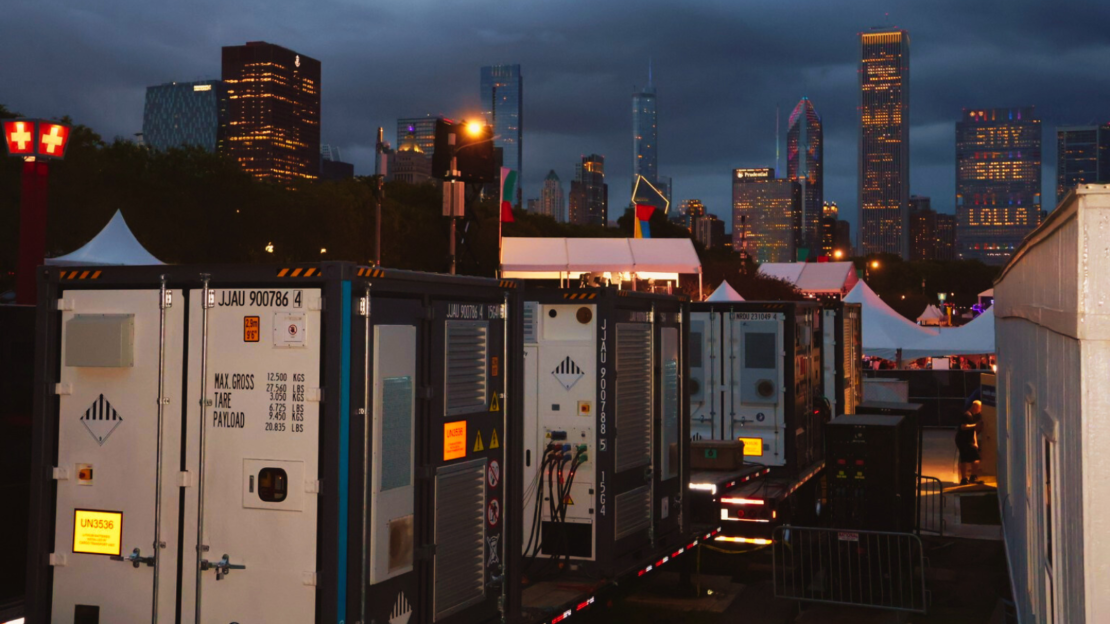Chair of Powerful Thinking, Tim Benson, shares his views on making the transition to large-scale Battery Energy Storage Systems (BESS) a reality. Tim shows the range of BESS’ application through a review of their use at 2024 events and suggests that a dramatic change in how we plan for power management is now required to ensure real progress: this means designing in alternatives as the norm and using the improved emissions data associated with these as a baseline – rather than direct comparison with business-as-usual power management models.
“2024 was a game changing year for sustainable event power, not just in the UK but across Europe and even as far afield as the US. Large-scale battery energy storage systems (BESS) suddenly started popping up behind major stages everywhere, including the Global Citizen Festival (NYC) and Lollapalooza (Chicago). Coldplay continued their successful deployment of the Showpower SmartGrid system across all 33 of their European stadia shows, whilst events like Massive Attack’s Act 1.5 and Freize Masters saw a broader integration of batteries across multiple site applications. Although less sexy, the latter examples here remain important, as we need to move away from the notion of pigeon-holing BESS as only being suitable in for particular circumstances and instead focus on designing in the most appropriate DC solution for all the applications in hand.
For many of us, this proof of concept comes as no real surprise and it was only a matter of time before the alternator got kicked firmly into touch by the inverter – I mean you ‘Cannae change the laws of physics Jim!’
However, despite the appetite for these kinds of innovations, market traction does remain limited. This can be attributed to a number of factors, including the price tag which reflects limited global fleet availability, a lack of real-world expertise in integrating these systems and inadequate power advancing which can erode confidence that sufficient energy storage capacity, to ensure that ‘the show will go on’, can be delivered.
What is clear is this – for our industry to reap the full benefits of using a BESS a dramatic change in how we plan for power management is required. At last year’s Vision: 2025 Sustainable Events Summit held at the Showman’s Show, a colleague said to me; ‘What we need to do is focus on designing out generators and designing in alternatives.’
Never has a truer word been spoken, and it highlights so well the major obstacle to changing power solutions: our obsession with making direct comparisons between business-as-usual power management models, i.e. conventional generator deployments, and those of more sustainable alternatives.
Our baseline for emissions comparisons needs to be reconsidered and should no longer rely on a comparison of mineral diesel versus the rest. For real change to be achieved, then we need to up the ante and use a baseline that pitches low carbon power solutions against one another, rather than starting with the lowest common denominator of mineral diesel and its 2.67Kg of CO2e per litre burned.
The old way of judging the value of power solutions will only slow down the decarbonisation process of temporary event power delivery, as even those solutions that offer only marginal emissions gains, will shine when compared to conventional solutions.
Would it be both fair or useful to compare today a Ford Fiesta Mk1 to Polestar2 or a ZX Spectrum to a MacBook Pro, I don’t think so, because our expectations have been shaped by what has gone before.
To ensure real progress, we need to make designing in alternatives the norm and use the improved emissions data associated with these as our baseline. Let’s stop applauding ourselves for doing the minimum and drive improvements by comparing new solutions against the best there was before.
Let’s make ‘designing in the best solution’ the singular benchmark for all emissions comparisons thereafter, as normalisation will now, and always be, the greatest driver of change – amen!”
This article originally appeared in our January 2025 Vision for Sustainable Events newsletter. Sign up to receive monthly event sustainability news, case studies and guest blogs direct to your inbox.

